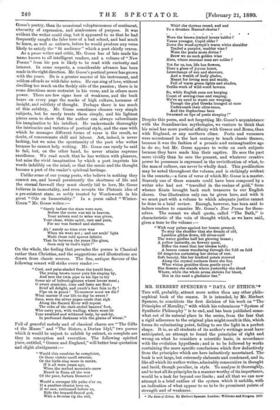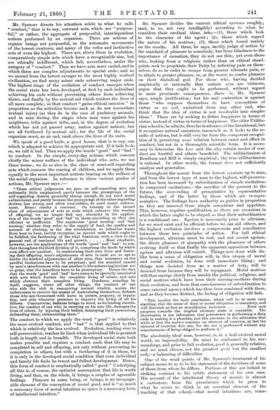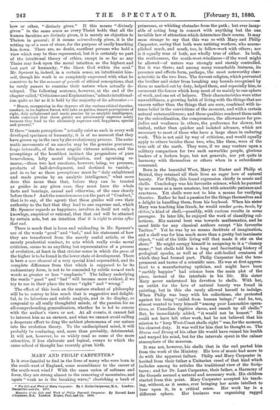MR. HERBERT SPENCER'S "DATA OF ETHICS."* THIS will, probably, attract
more notice than any other philo- sophical book of the season. It is intended, by Mr. Herbert Spencer, to constitute the first division of his work on "The. Principles of Morality," with which his voluminous "System of Synthetic Philosophy" is to end, and has been published some- what out of its natural place in the series, from the fear that a rigid adherence to the original plan might result in this, whiclb forms its culminating point, failing to see the light in a perfect shape. It is, as all students of its author's writings must have' anticipated, an attempt to found the principles of right and wrong on what he considers a scientific basis, in accordance. with the evolution hypothesis ; and is to be followed by works containing the more specific conclusions which flow deductively from the principles which are here inductively ascertained. The. book is not large, but extremely elaborate and condensed, and is,. like all which its author writes, admirably consecutive in thought and lucid, though peculiar, in style. To analyse it thoroughly, and to test all its principles in a manner worthy of its importance,. would be a task far beyond our limits; and all that we can now attempt is a brief outline of the system which it unfolds, with an indication of what appear to us to be its prominent points of strength and of weakness.
* The Data of Ethics. By Herbert spencer. London: Williams and Norgate. 1879
Mr. Spencer directs his attention solely to what he calls "conduct," that is to say, outward acts, which are "purpose- ful," or rather, the aggregate of purposeful, interdependent actions performed by an organism. There are actions of organic beings not purposeful, as the automatic movements of the lowest creatures, and many of the reflex and instinctive acts of even the highest. There are, above them in evolution, Comparatively simple acts which have a recognisable aim, but are ethically indifferent, which fall, nevertheless, under the category of "conduct." Then we have acts more varied, and in which there are complex adjustments to special ends; and as we ascend from the lowest savages to the most highly evolved civilisation, we find many minor ends subserving major ends.
The highest stage of the evolution of conduct emerges when the social state has been developed, at first by each individual achieving his ends without preventing others from achieving theirs, and finally by the mutual aid which renders the lives of all more complete; so that conduct "gains ethical sanction" in proportion as the activities become such as do not necessitate mutual injury (as they do in the case of predatory animals, and in man during the stages when man wars against his neighbour, tribe against tribe, and, in the degree of evolution which has not yet passed away, nation against nation), but are all furthered by mutual aid ; for the life of the social organism must, as an end, rank above the lives of its units.
We speak of a good knife, a good house, that is to say, one which is adapted to achieve its appropriate end. If it fails to do so, we call it bad. Then we apply the words "good" and "bad" to conduct. In the simple, every-day actions which concern chiefly the minor welfare of the individual who acts, we use these terms ; we do so also in the class of semi-self-regarding acts which concern the rearing of children, and we apply them equally to the most important actions bearing on the welfare of the social organism. In reference to these various grades of actions, Mr. Spencer says :—
"Those ethical judgments we pass on self-regarding acts are ordinarily little emphasised, partly because the promptings of the self-regarding desires, generally strong enough, do not need moral enforcement, and partly because the promptings of the other-regarding desires, less strong, and often over-ridden, do need moral enforce. ment. Hence results a contrast. On turning to the second class of adjustments of acts to ends which subserve the rearing of offspring, we no longer find any obscurity in the applica- tion of the words 'good' and 'bad' to them, according as they are efficient or inefficient. The expression good nursing' and 'bad nursing,' whether they refer to the supply of food, the quality and amount of clothing, or the due ministration to infantine wants from hour to hour, tacitly recognise, as special ends which ought to be fulfilled, the furthering of the vital functions, with a view to the
general end of continual life and growth Most emphatic, however, are the applications of the words 'good' and 'bad' to con- duct throughout the third division of it, comprisng the deeds by which men affect one another. In maintaining their own lives and foster- ing their offspring, men's adjustments of acts to ends are so apt to hinder the kindred adjustments of other men, that insistence on the needful limitations have to be perpetual; and the mischief caused by men's interferences with one another's life-subserving:actions are so great, that the interdicts have to be peremptory. Hence the fact that the words 'good' and 'bad' have come to be specially associated with acts which further the complete living of others, and acts which obstruct their complete living. Goodness, standing by itself, suggests, above all other things, the conduct of one who aids the sick in reacquiring normal vitality, assists the unfortunate to recover the means of maintaining themselves, defends those who are threatened with harm in person, property, or reputa- tion, and aids whatever promises to improve the living of all his fellows. Contrariwise, badness brings to mind, as its leading correla- tive, the conduct of one who, in carrying on his own life, damages the lives of others, by injuring their bodies, destroying their possessions, defrauding them, calumniating them."
The conduct to which we apply the word " good " is relatively the more evolved conduct, and "bad" is that applied to that which is relatively the less evolved. Evolution, tending ever to self-preservation, reaches its limit when individual life is greatest both in length and in breadth. The developed social state both makes possible and requires a conduct such that life may be completed in self and offspring, not only without preventing its completion in others, but with a furthering of it in them, for it is only in the developed social condition that even individual and family life finds its truest and fullest development. Hence, this form of conduct is emphatically called" good." Underlying all this is, of course, the optimist assumption that life is worth living, and that, on the whole, it brings a surplus of agreeable feelings. Pleasure to some being, or beings, is an inexpugn- able element of the conception of moral good, and is "as much a necessary form of moral intuition as space is a necessary form of intellectual intuition?' Mr. Spencer divides the current ethical systems roughly, (and, to us, not very intelligibly) according to what he considers their cardinal ideas, into,—(1), those which look to the character of the agent ; (2), those which regard the nature of his motives ; (3), those which found mainly on the results. All three, he says, tacitly judge of action by the standard of pleasure to somebody, but from blindness to the importance of causation, they do not see this; yet even those who, looking from a religious rather than an ethical stand- point, seek to propitiate their Deity by inflicting pain on them- selves, do so in order to escape from greater ultimate pain, or to attain to greater pleasure, or, at the worst, to confer pleasure on their diabolical god. For those who, having decided empirically or rationally that certain acts are virtuous, argue that they ought to be performed, without regard to mere proximate consequences, there is, Mr. Spencer says, ample justification ; but his real contention is against those "who suppose themselves to have conceptions of virtue as an end, underived from any other end, who think that the idea of virtue is not resolvable into simpler ideas." These err by seeking to define happiness in terms of virtue, instead of virtue in terms of happiness. The older Utilita- rian school is, he admits, thus far in advance of the Intuitional, but it recognises natural causation, inasmuch as it looks to the re- sults of actions, but is still very far from the competent recogni- tion of it, perceiving some relation between cause and effect in conduct, but not in a thoroughly scientific form. It is neces- sary to determine the how and the why certain modes of con- duct are hurtful and others beneficial. The utilitarianism of Bentham and Mill is simply empirical ; the true utilitarianism is rational. In other words, the former does not sufficiently analyse and generalise.
Throughout the ascent from the lowest creature up to man,. and from the lowest type of man to the highest, self-preserva- tion has been increased by subordination of simple excitations to compound excitations,—the sacrifice of the present to the- future, the over-ruling of presentative by representative. feelings, and of the latter by those which are re-repre- sentative. The feelings have authority as guides in proportion as they are removed from simple sensations and appetites. This, however, requires qualification, as there are occasions in which the latter ought to be obeyed, so that their subordination is a conditional one. Egoism is necessarily prior to altruism,.
for we must exist and be efficient before we can aid others, and the highest evolution involves a compromise and conciliation between these two principles of action. For full ethical
development, altruism must be real, and not covert egoism, the direct pleasure of sympathy with the pleasures of others evolving itself so that finally the apparent opposition between egoism and altruism will vanish. Things now done with dis- like from a sense of obligation will, in this utopia of moral and social evolution, be done with immediate liking ; and.
things now desisted from as a matter of duty, will be desisted from because they will be repugnant. Moral motives will thus emerge slowly from amidst the political, religious, and social motives which have been their nursing-mothers during their evolution, and from that consciousness of subordination to some external agency which has thus been combined with them, and as they become distinct, the feeling of obligation will fade.
"This implies the tacit conclusion, which will be to most very startling, that the sense of duty or moral obligation is transitory, and
will diminish as fast as moralisation increases Even now progress towards the implied ultimate state is traceable. The observation is not infrequent that persistence in performing a duty ends in making it a pleasure, and this amounts to the admission that while at first the motive contains an element of coercion, at last the element of coercion dies out, for the act is performed without any consciousness of being obliged to perform it."
The absolutely ideal man, however, is, in a half-evolved moral world, an impossibility. He must be conformed to his sur- roundings, and prior to full evolution, good is generally relative, and we must choose, not the greatest good but the smallest evil,—a balancing of difficulties.
One of the weak points of Mr. Spencer's treatment of his subject seems to us to be his statement of the doctrines of some of those from whom he differs. Portions of this are indeed in striking contrast to his subtle statement of his own case. His account of the intuitional theory of morals is almost a caricature, from the prominence which he gives to what he seems to think is an essential element of the teaching of that school,—that moral intuitions are, some- how or other, "divinely given." If this means "divinely given" in the same sense as every Theist holds that all the
human faculties are divinely given, it is merely an objection to Theism in general; if it means miraculously given, it is the setting up of a man of straw, for the purpose of easily knocking him down. There are, no doubt, excellent persons who hold a view which may be thus represented, but it is certainly no part
of the intuitional theory of ethics, except in so far as any Theist may look upon the moral intuition as the highest and beat part of humanity, "the likest God within the soul." Mr. Spencer is, indeed, in a certain sense, an intuitionist him-
self, though his work is so completely engrossed with what he conceives to be the manner of growth of ethical conceptions, that he rarely pauses to examine their nature when actually de- veloped. The following sentence, however, at the end of the chapter called," Criticisms and Explanations," admits intuitional- ism quite as far as it is held by the majority of its advocates :— "Hence, recognising in due degrees all the various ethical theories, conduct, in its highest forms, will take as guides, innate perceptions of right, duly enlightened and made precise by an analytic intelligence, while conscious that these guides are proximately supreme solely because they lead to the ultimately supreme end, happiness, special and general."
If these "innate perceptions "actually exist as such in every well developed specimen of humanity, it is of no moment that they have grown up in the race bOhe evolutionary process. The auto- matic movements of an amceba may be the genuine precursor, Zongo intervallo, of the most angelic virtuous actions, and the promptings of the humblest instinct the progenitors of pure benevolence, lofty moral indignation, and agonising re- morse,—these two last emotions, however, being, we presume, products of half-development, and destined to vanish,— and in so far as these perceptions must be "duly enlightened and made precise by an analytic intelligence," what more does this mean than that, before they can be trusted
as guides in any given case, they must have the whole facts and bearings, causal and otherwise, of the case clearly
before them P And the consciousness (on the part of "Conduct," -that is to say, of the agent) that these guides will owe their
authority to the fact that they lead to one supreme end, which Mr. Spencer regards as happiness, involves in itself not only a knowlege, empirical or rational, that that end will be attained
by certain acts, but an intuition that it is right to strive after that end.
There is much that is loose and misleading in Mr. Spencer's use of the words "good" and " bad ;" and his statement of how -they are transferred from the merely useful article, or the merely prudential conduct, to acts which really evoke moral criticism, seems to us anything but representative of a process of evolution, at least in that stricter sense in which the germ of the higher is to be found in the lower state of development. There is here a new element of a very special kind superadded, and its complete difference from that which is supposed to be its
rudimentary form, is not to be concealed by subtle usen of such words as greater or less "emphasis." The fallacy underlying the words " good " and " bad " will become more evident, if we try to use in their place the terms " right " and "wrong."
The effect of this book on the mature student of philosophy will be to convey to him much that is suggestive and delight- ful, in its laborious and subtle analysis, and in its display, so congenial to all really thoughtful minds, of the passion for an all-comprehending generalisation, whether he is led to concur with the author's views or not. At all events, it cannot fail to interest him as an earnest, and what we cannot avoid calling a desperate effort to drag the noblest phenomena of our nature into the evolution theory. To the undisciplined mind, it will probably be confusing, and, more than probably, detrimental It will not, however, be so widely read as some of the more attractive, if less elaborate and logical, essays to which the same school of thought has recently given birth.




































 Previous page
Previous page